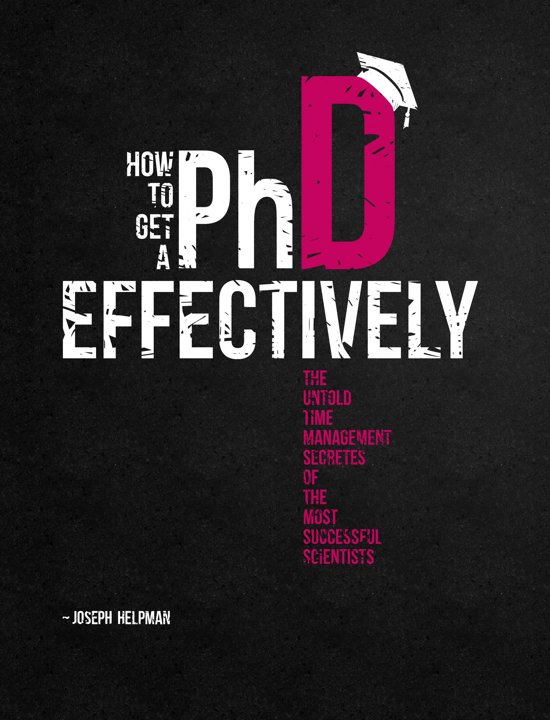Book review: How to get a PhD effectively – Joseph Helpman
Recently, I was contacted by a scientist who uses the pseudonym Joseph Helpman to review his book, “How to get a PhD effectively”. The subtitle of the book is “The untold time-management secrets of the most successful scientists” and the synopsis of the book is the following:
This is not another typical guidebook about the methodological issues of earning a PhD. It is a bible of productivity in science. The contents include not only time-management strategies, but also a mindset that will help you earn a high-quality PhD faster. It is specifically aimed at showing you how to use the tools that most successful scientists would rather hide for themselves. The goal is to organize a PhD research project without harm to your personal life. We live in the era of knowledge and hard work is no longer the best solution. Nowadays, it is smart work that counts and provides the best results. This is why, from now on – don’t be just a dreamer, be an achiever. Get a PhD fast and smart.
Let me show you how to do it!!
For those of you who follow me on Goodreads, you might have already seen that I rated the book as 2 stars (“it was ok”). The main reason why I didn’t rate the book higher, is that I feel like at some points the author is encouraging PhD students to cut corners. I am completely opposed to the advise of the author to stick to the bare minimum when it comes to reading papers for your literature review – I think reading broadly in your discipline is a necessary part of keeping up to date with your field.
The books is subdivided into three main chapters:
- Before you start
- Time-management principles for scientist
- The mindset of a productive scientist
Since a third of the book focuses on things you should know (or wished you knew) before you start your PhD, the book seems to be mostly aimed at students who are contemplating applying for a PhD program. While this information is useful for future PhD students, it might not really cover the main topic of the book, which is essentially time management for PhD students and all scientists. Somehow, this off-topic introduction makes the book feel a bit like a diesel engine – slow to start.
The second chapter on time management for scientists is a good overview of effective time management methods that are easy to apply.
While I think there is a thin line between what is ethical and not when it comes to outsourcing tasks for your PhD research, I understand the point the author is making where he suggests to hire as much help as possible. However, for most PhD students on a small scholarship, I don’t think this option is valid.
The author seems to borrow a lot from The 4-Hour Workweek by Tim Ferriss (which I just did not like), and it just makes me wonder why you would do a PhD in the first place if you try to shove off as many tasks as possible to someone else.
Don’t get me wrong though – I think outsourcing smaller chunks of research to, for example, master’s students as a thesis topic is perfectly fine. But in this case we are talking about learning to delegate some work, and educating a younger graduate student into your topic – and you won’t be paying for this.
Simply hiring a student who is even poorer than you to go and browse the library seems to me a little strange (but maybe that’s because I never disliked sniffing around the library – I always ended up finding more hidden gems than what I came in for in the first place…)
The third chapter mostly deals with work-life balance and staying sane and healthy in graduate school. This chapter is certainly important, and it’s good to find it along with and in a book about scientific productivity. Without a healthy, rested mind and body, it becomes very difficult to produce high-quality research. The book subdivides this into “Social Relations”, “Health”, “Finance” and “Private Life”. The best reminder for me was the subchapter on social relations. As I tend to be very focused on work, sports and music, I tend to leave very little time for just hanging out with people in my schedule. I like the idea from the book to be more conscious about phone calls and visits – and it was a good reminder for me to isolate myself a little less from the rest of the world.
To conclude, “How to get a PhD effectively” is a book I would recommend to a graduate student planning to pursue a PhD.
While I think some of the time management strategies sound more like cutting corners than enjoying the depth of your research work, the book does summarize very well how to learn planning your time in a way that is rather similar to my own time management system.
Finally, the chapter that deals with work-life balance is an important reminder of the fact that there’s much more to life than just your PhD. I especially found the reminder about social relations (i.e. do not hide away from the world because of your PhD) refreshing to read. Certainly not the best PhD book out there, but it’s a fast and pleasant read.
On Google Books, you can access the first two chapters of the book, if you want to get an idea of what the book covers.

